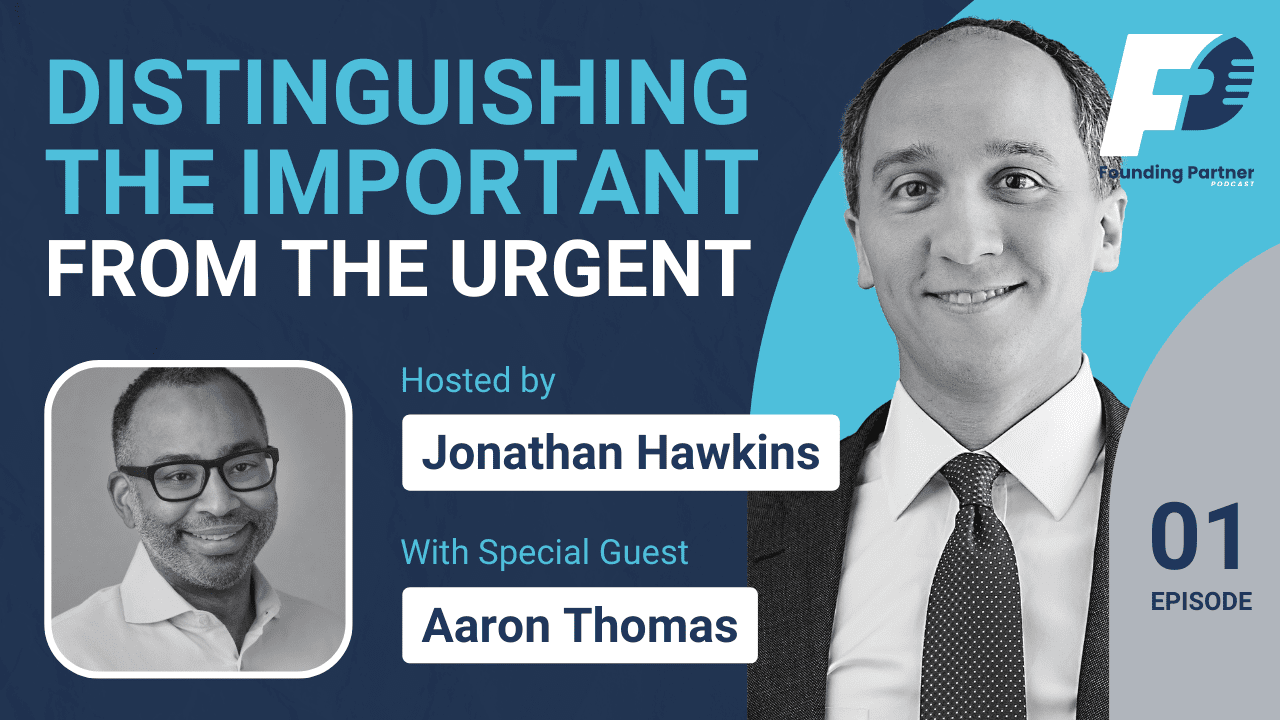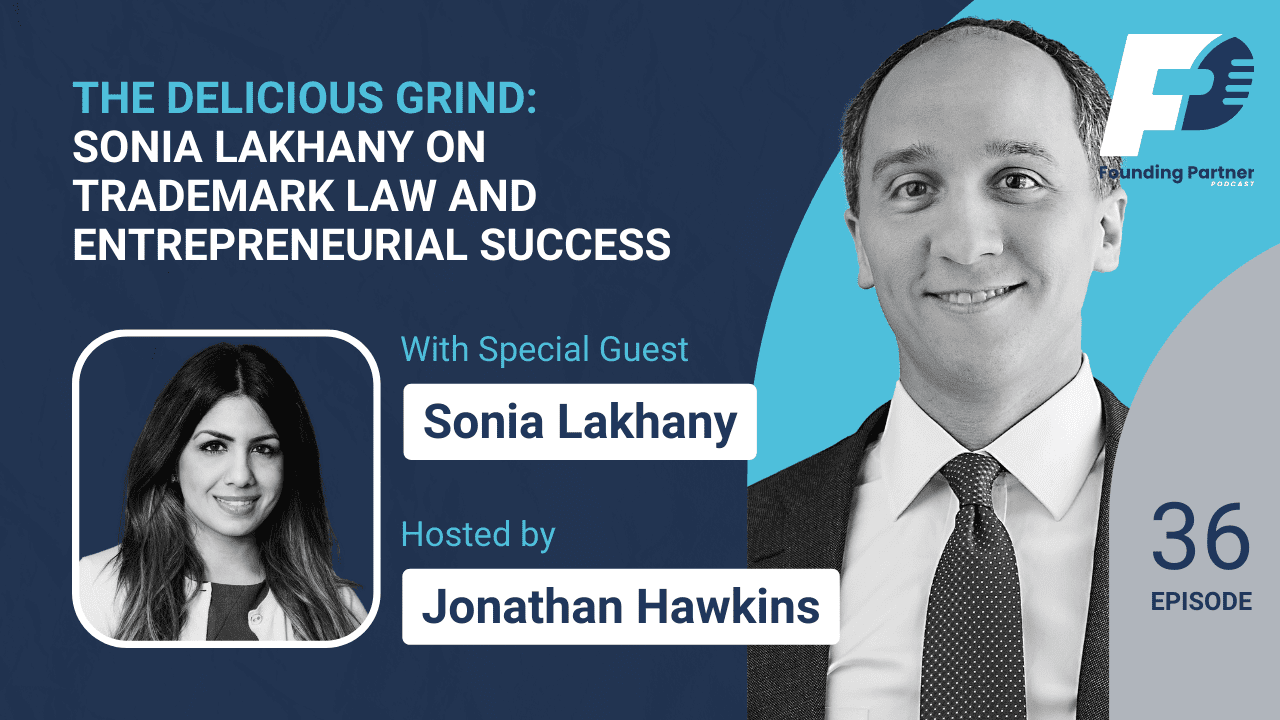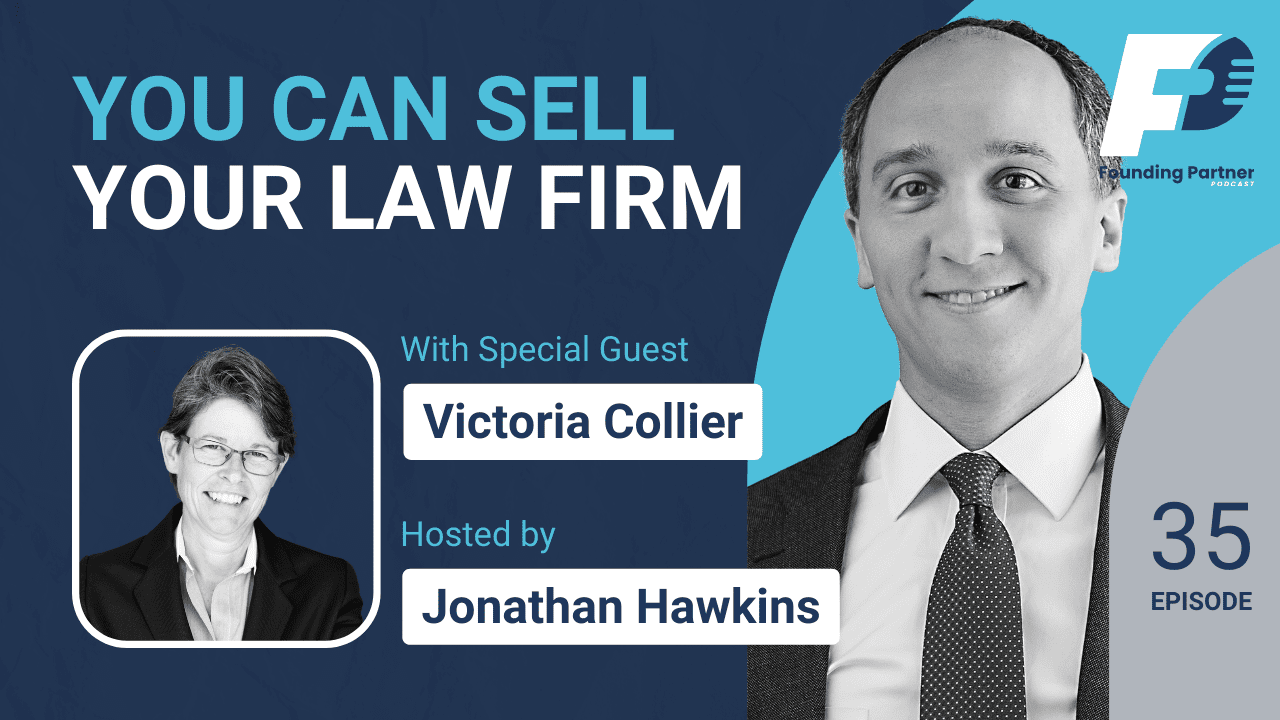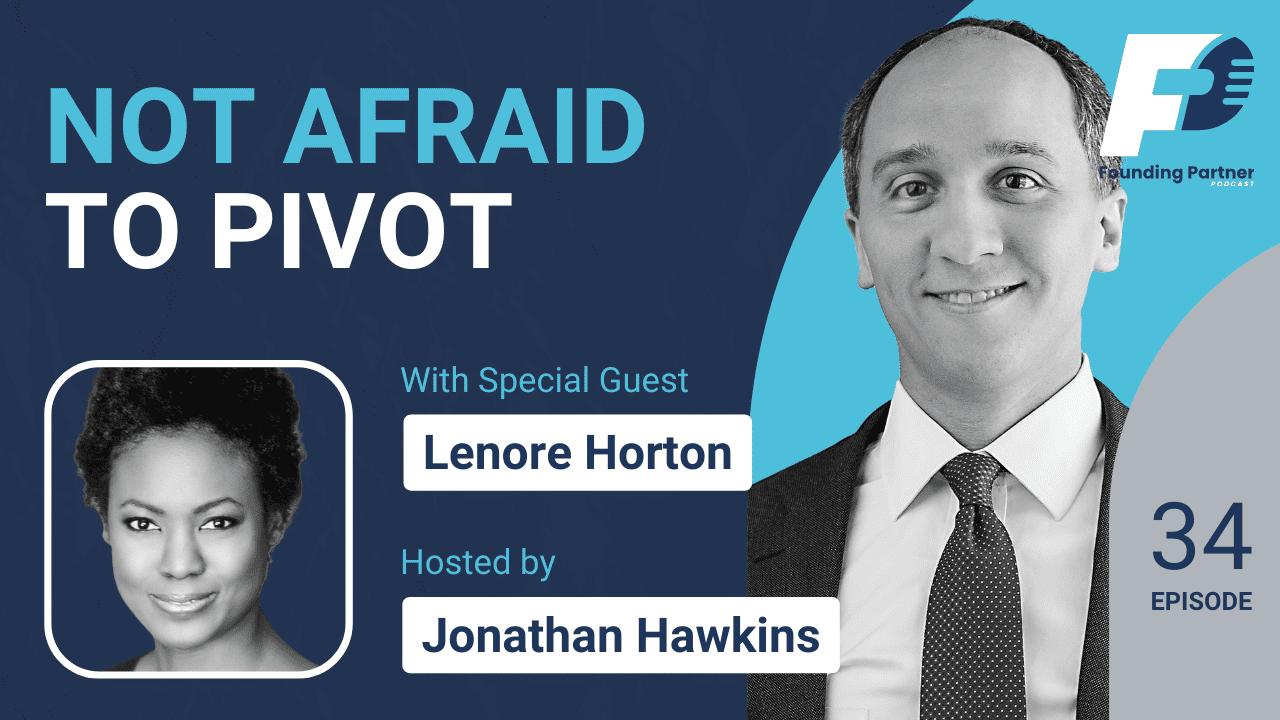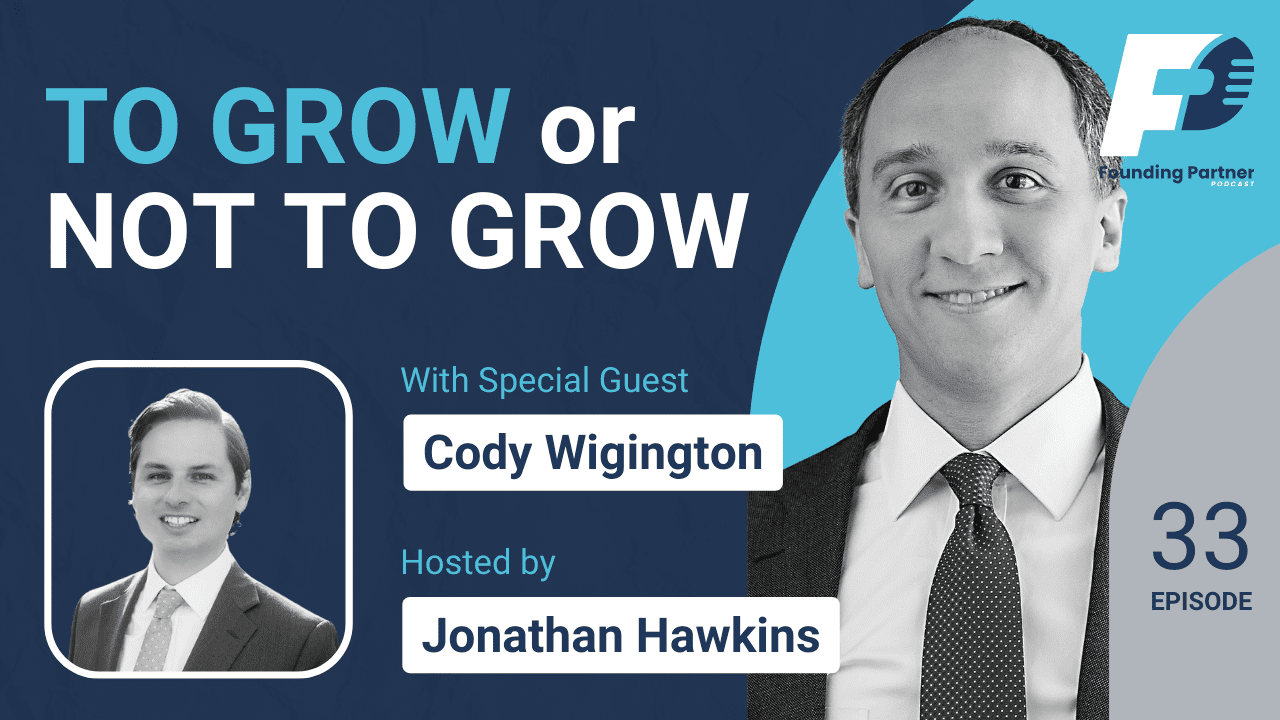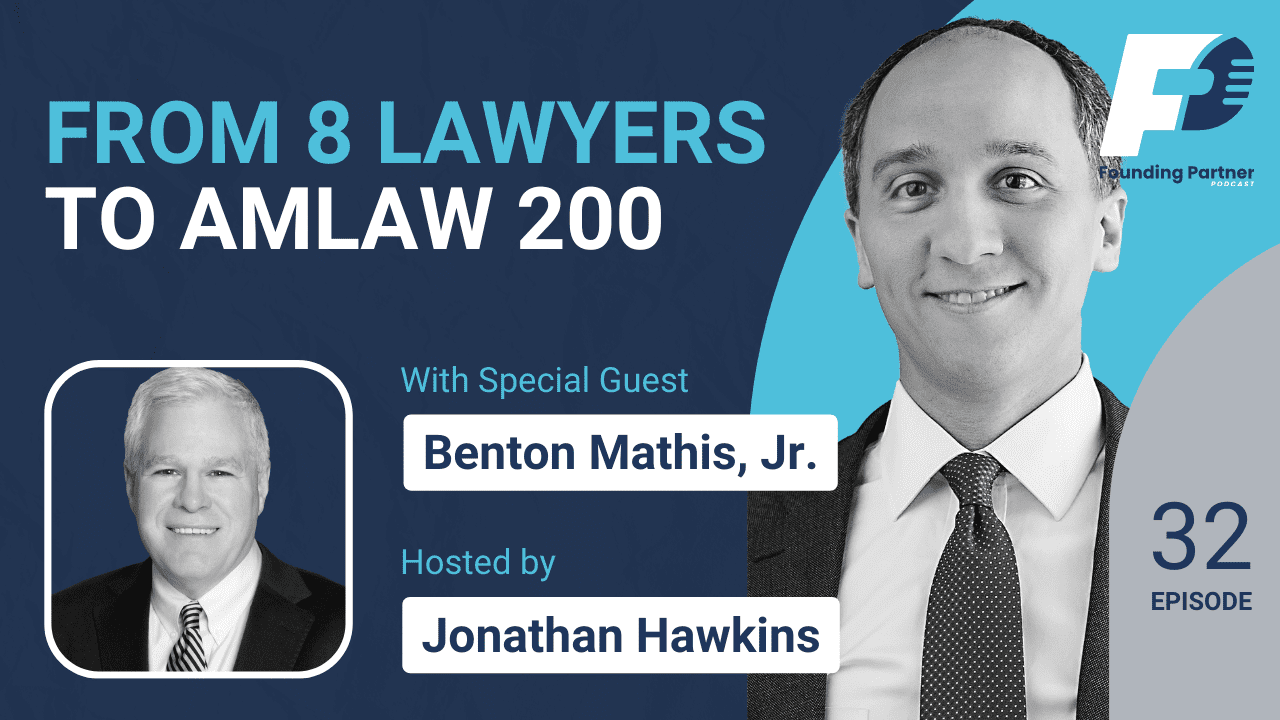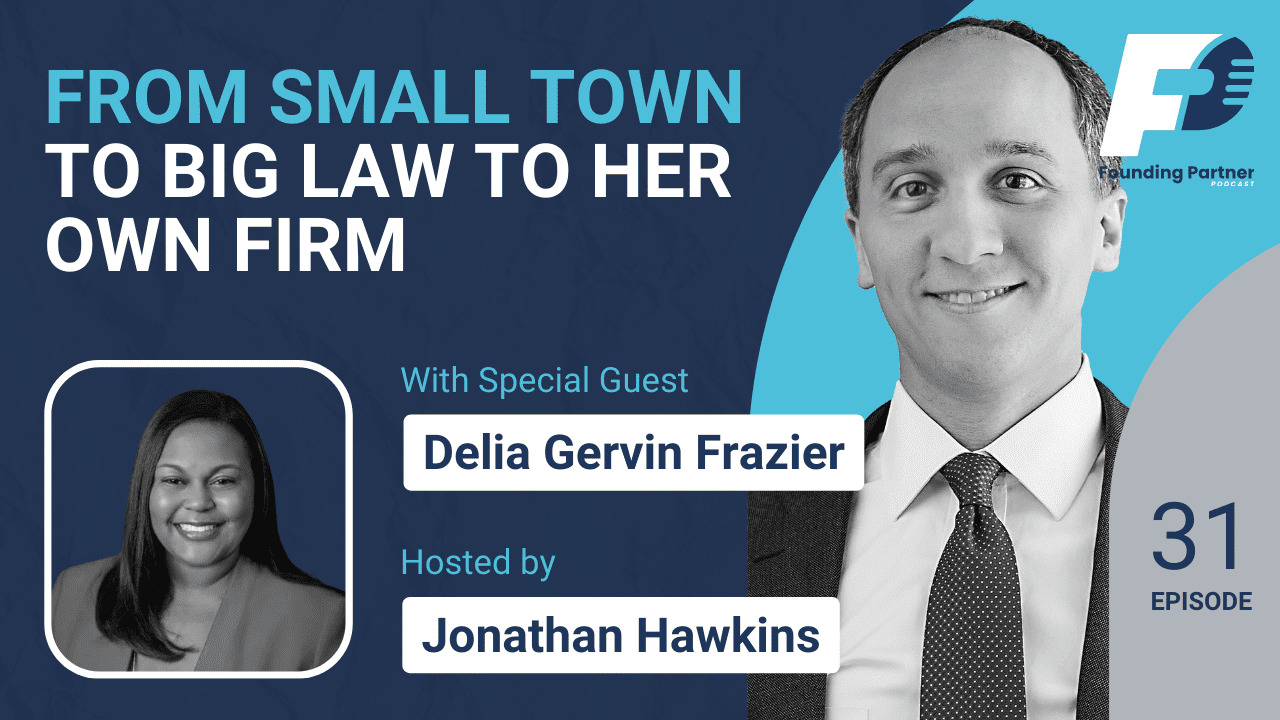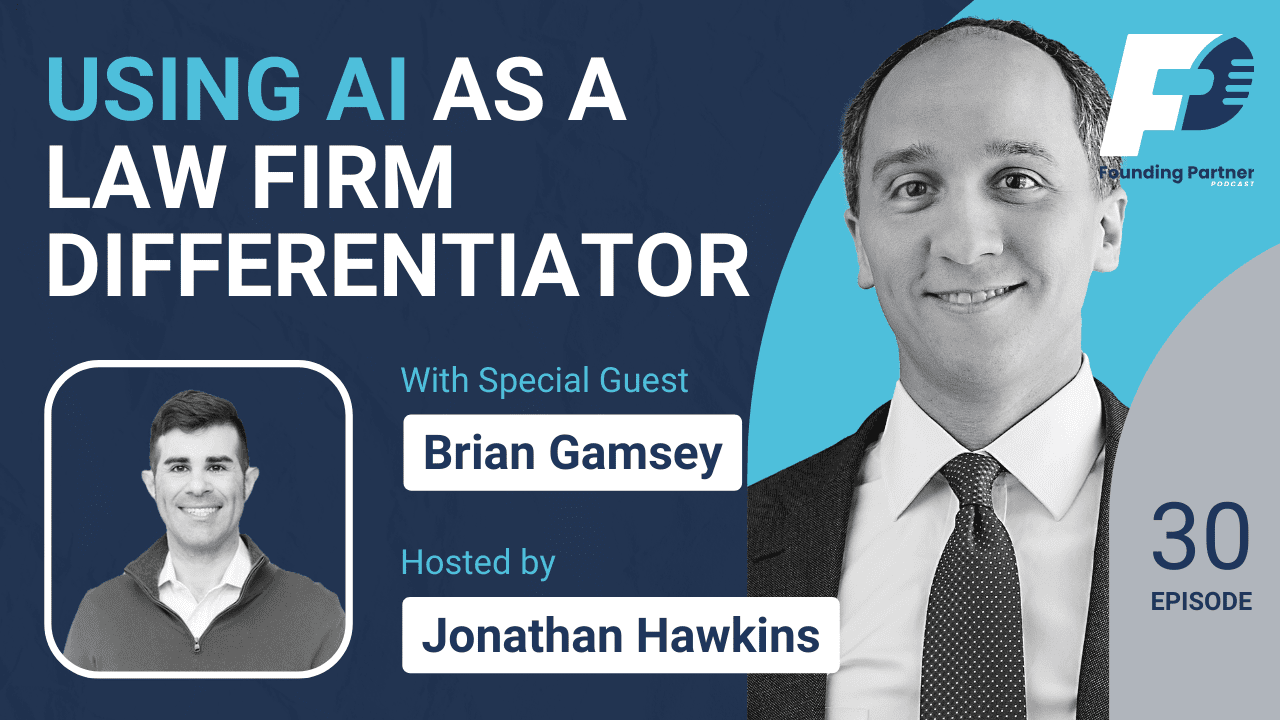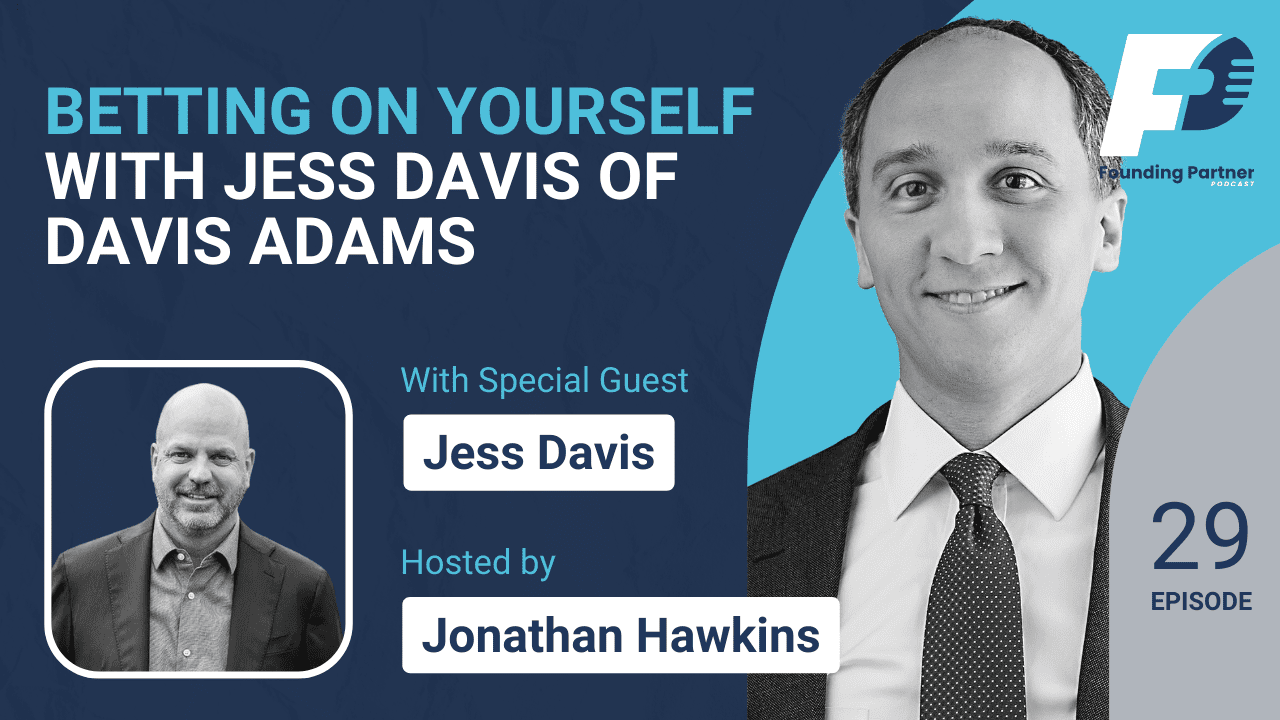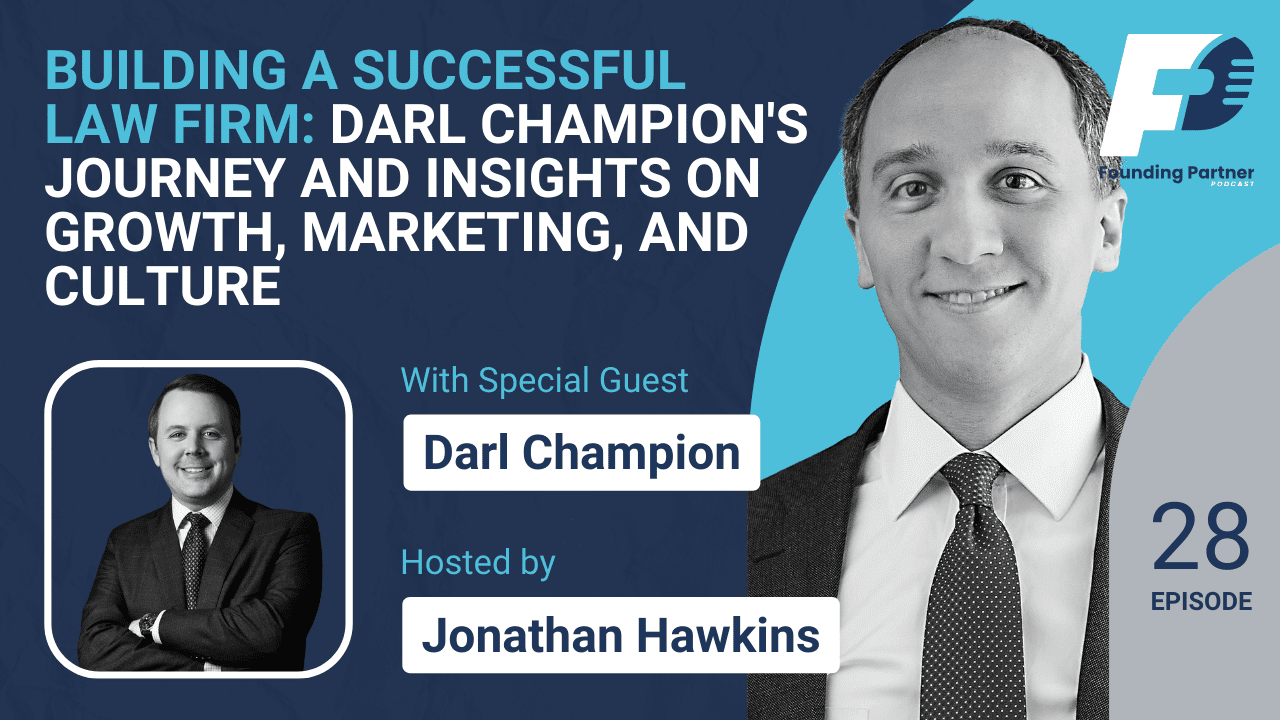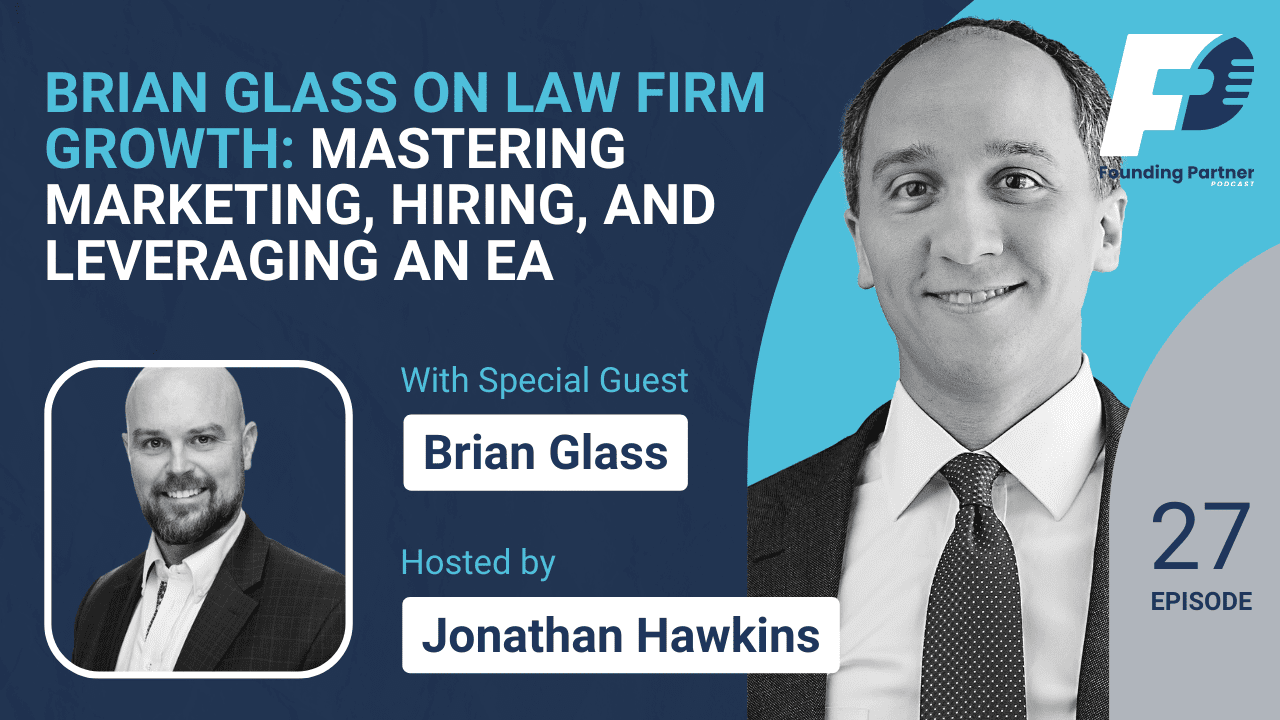Jonathan Hawkins: [00:00:00] Let’s talk about when you started your, your last firm, you know, you started out, was it just you, did you have any help with, you know, staff, anybody in the beginning, how, how did you do that?
Yeah,
Aaron Thomas: it was. It was me on my laptop in the spare bedroom of our apartment when I started Aaron Thomas law. I, you know, initially had no help. There were some of the counties that weren’t even. On e-filing yet, so I was, you know, I was the person that would that would go and and and copy, you know, pleadings and drive over to the post office.
Myself. I had the little stamps.Com scale on my desk in my apartment. You know, sometimes I would have to drive to the actual courthouse, you know, clerk’s office to figure out how to get something filed because, you know, I’d never done the paralegal’s job before and, and now I was the, I was the lawyer, I was the secretary, I was the paralegal, I was the receptionist the whole nine.
[00:01:00]
Jonathan Hawkins: Welcome to the founding partner podcast. I’m Jonathan Hawkins, the founder of law firm GC, a law firm that represents lawyers and law firms in business related matters. Excited to have our guest today, Aaron Thomas. He’s the founder of prenups. com. And Aaron, why don’t you introduce yourself?
Aaron Thomas: Yeah, well, and that’s, that’s what I was going to say.
Aaron Thomas, the founder of prenups. com. I’m a longtime family law attorney. I’ve been practicing. Law for 20 years, family law exclusively for almost all of that time for most of that time. And [00:02:00] yeah, recently founded prenups. com. So yeah.
Jonathan Hawkins: You know, we met. I looked it up. I think it was about a year and a half ago.
And I remember we went had lunch and you know, you were telling me about what you were doing and what you were thinking about doing. And it was just right up my alley. I remember walking out of there thinking about this guy. I like this guy. He thinks like I do. And so I want to, I want to sort of walk through a little bit of your, your history.
And maybe we’ll start it sort of undergrad real quick. And then sort of take us through sort of where you are now. So, where’d you go to undergrad? What, what, what’d you study?
Aaron Thomas: I went to Emory University. That was my. Kind of tied to Atlanta. I’m from Memphis originally but came down to Atlanta for college.
I got my degree in political science. Knew I was going to go to law school from before I even started college. So, whatever was going to get me there easiest was, was kind of my route.
Jonathan Hawkins: Okay. So you knew it after undergrad, you get straight to law [00:03:00] school. Just take any time off.
Aaron Thomas: I took one year off.
I’d already gotten into law school. I deferred for a year, worked and paid off my college credit cards and saved up a little bit of cash and then and then went to law school the following year. Nice.
Jonathan Hawkins: And and and don’t leave out where you went to law school. Harvard
Aaron Thomas: Law School. Yes. Harvard Law School. Yeah, that’s where I, where I went and so I took him up on the offer.
Jonathan Hawkins: Impressive. So then after that, you came back to Atlanta. Did you go straight into family law or something else?
Aaron Thomas: I didn’t, you know, I went to law school assuming that I would just work for the biggest, baddest New York law firm that I could get into. And after one summer there, I realized that that was not going to be the life for me.
I came back to Atlanta without a job, didn’t really know what I was going to do. Ended up working for Habitat for Humanity in house for a couple of years. I figure I can do some good while I’m trying to figure out, you know, what I want to do with my life, [00:04:00] and decided I wanted to litigate. And nobody litigates more than prosecutors and public defenders.
So, from Habitat, I went to the DeKalb County Public Defender’s Office here in Atlanta, Georgia. And I was there for three years. Got some trial experience, and then a family law firm. needed somebody with trial experience. I had it. They recruited me in. And so I kind of really stumbled into family law.
It wasn’t like something that I, you know, sat down with all the options, thought about it and pick this from a list. But it was kind of where I ended up and and family lawyers go to court and I like going to court. And so it was a good match.
Jonathan Hawkins: Cool. So you were at that firm for a while, and eventually you went out and started your own firm, right?
Or did you leave that firm to start a firm, or did you do something in between that firm
Aaron Thomas: and your firm? Yeah, yeah. So, interestingly I when I was working for the family law firm I was paying off my student loans like, you know, many of us did. And I tried to, I was trying to [00:05:00] get rid of them on such an accelerated schedule.
I was, I was basically, you know, living on 1 of my 2 monthly paychecks and putting the other 1 towards paying down debt. And after doing that for a while and got rid of my loans, I, it struck me that I could, you know, at that You know, currently 50 percent savings rate that I could save up, you know, a good amount of cash and do kind of what had been a dream trip for me for a while, which is, you know, I’d had this dream of, of taking a year off and traveling around South America.
And so, that’s basically what I did. Me and my then girlfriend now wife both left our jobs at the same time at the end of 2013 and we spent 2014 traipsing around South America.
Jonathan Hawkins: Nice. So you, you stopped practicing law completely. No remote. Law or anything, right?
Aaron Thomas: No remote law. I, I wrote legal articles for a couple of different websites while I was traveling just to have, you know, some, some spending money coming in.
But I was not practicing law. My wife actually came back to [00:06:00] the U. S. after 12 months and I wanted to continue working on my Spanish. So I spent another 3 months in, in Central America before coming back and in mid 2015 yeah, start my practice. Where
Jonathan Hawkins: did you go down there? I’m curious.
Aaron Thomas: Yeah. Yeah. So we spent, we spent the first 6 months in Ecuador where my wife’s family is from, and then we spent probably, you know, 2 to 4 weeks each in Colombia, Peru, Bolivia, Chile, Argentina, a little bit in Uruguay, and then Brazil and then that’s when my wife came back. To the U. S. And then I went and spent three months in Panama, Costa Rica.
And most of the time, really, on the coast of Nicaragua in a little beach town, little surf town there. So, yeah, experience of lifetime. Yeah, you
Jonathan Hawkins: know, I did that in between undergrad and law school, went down, spend about 3. 5 months in Costa Rica. And I did not want to leave but I ran out of money and I had a job down there, but they said, you know, it doesn’t, it was September and I said, you have a [00:07:00] job.
It doesn’t start till January, which was the, you know, the busy season. And I was like, I don’t have any money to stay till then. So I came back to the States expecting to go back, but then never did. So, but yeah, I loved it down there. Yeah, it’s beautiful. All right. So then you come back and you, is this when you start your own law firm?
Aaron Thomas: Kind of, I wasn’t even 100 percent sure, you know, I knew that after you pull off, you know, 15 months in Latin America that, that kind of changes the scope of options in your brain as to what is possible. At least it did for me. And so. All I knew was I wasn’t going to go back and just become an employee at at the firm that I’d worked at previously.
I toyed with the idea of, you know, starting a couple other different types of businesses but that summer of 2015, I had a couple of my former clients reach out to me and say, hey, you did a great job on my case previously. I need to go back to court or you know, I got married again and I shouldn’t have, and I need your help
And and I said, [00:08:00] yeah, I will help you. And you know, I liked the people that were reaching out to me. I wanted to help ’em. And you know, I figured if I’m gonna do this, I might as well do it. Right. I hung up my shingle started my law firm and, and you know, the rest, as they say was history.
Jonathan Hawkins: Yeah.
So that, and that was, it was only only family law, right? Or did you do other stuff?
Aaron Thomas: I only did family law. Okay. Yeah.
Jonathan Hawkins: So when we met that you were still running your firm I guess the immediate preceding incarnation of your firm when we met. And I remember you talking about, hey, I’ve got this other idea.
So so talk me through that.
Aaron Thomas: Yeah. Yeah. So my, my law firm, my previous law firm was Aaron Thomas law. And had grown it, had built it up over, you know, a number of years, but even from the early days, I wanted to develop a niche in prenuptial agreements. You know, shortly after the time that my wife and I got back [00:09:00] from Latin America is when we got engaged.
My wife is also a lawyer. And so for us, it was a foregone conclusion that we would have a prenup of our own. You know, I mean, One thing I picked up doing family law was, you know, how necessary they are, how You know, beneficial. They are how much they save time and heartache and stress and money down the line for my clients.
And so I knew I was going to have one. And, we really set out to write, you know, like, kind of the perfect prenup. Like, If we were to write a prenup that not only would prevent against a messy divorce, but like, actually help us stay married. What would that look like? And you know, once once I kind of developed that, you know, friends and other people were like, you’ve got you’ve got to.
Make this a thing. You’ve got to tell other people that this exists. You know, most people have a negative view of prenups and I wanted to do a positive view of prenups. It took it. It has taken that entire time for me to kind of figure out how to make that niche work. The original iteration of it was I think back in 2016, [00:10:00] I started a website and we called it.
We nuptial. And you can probably see where I was trying to go there was it broke the rule of you know, don’t be cute or clever. Be clear. You know, we’re trying to take it as, you know, like, this is a, we not sure it’s, you know, you’re doing it together with your spouse and it’s a good thing.
But the next iteration of it was georgia prenups dot com. So you could probably guess the lesson I learned from that 1st iteration, you know, once we were georgia prenups dot com, nobody asked what it was that we did and where we did it. You know, it was the other end of the spectrum was very clear.
And and then two years ago is when I, you know, negotiated the acquisition of the URL that we use today, prenups. com. And
Jonathan Hawkins: so now it’s not limited to Georgia. You’re going national, right?
Aaron Thomas: That’s right. Yeah. Yeah. We’re trying to go national. My, my ethics attorney reminds me to say multi state until we’re in all 50 states.
But yeah, I mean, that’s that’s the ultimate goal is to be coast to coast provider of prenuptial [00:11:00] agreements.
Jonathan Hawkins: Yeah, and so I remember when we met the 1st time, I think you had 2 or 3 attorneys working for you. You had several paralegals. You had a big firm. I mean, a decent firm going with lots of work.
Yeah. You’re probably making pretty good money. And then I, I, I feel like it was within a month or two. We talked again and you’re like, everything’s changed. Do you
Aaron Thomas: remember this? Yeah, I do. I
Jonathan Hawkins: do. What happened and what’d you do?
Aaron Thomas: Yeah. Yeah. So the firm was at, we were at eight people. It was myself, three attorneys three paralegals, my marketing, and coordinator and you know, lots of, it was a combination of a lot of life events that kind of led me to want to make that change.
But at the end of the day you know, this is what was going to you know, 1, this has been my dream project forever. And I realized that you’re never going to [00:12:00] build it in 2 hours a week. That you have left over after you are, you know, running, you know, a pretty busy, you know, growing law practice.
You can’t, you know, you can’t break into, you know, you know, what I was trying to do in a couple hours on the side. And this was also what was going to give me the freedom to. Be more location independent, spend time with my family up in Memphis and, you know, even really be more present for, you know, my wife and my daughter.
And so all of those things coming together made me want to make the leap and go directly into only doing prenups dot com. So, yeah, we closed the family law firm down in the end of August of 2022. And since then it’s been 100 percent of my focus on prenups. com. I mean, I, I’ve, I had, you know, a lot of cases that I kept after that date you know, clients that I’d grown close to or, [00:13:00] you know, trials that were coming up.
So I was still technically practicing family law cases until probably March or April of 2023. But that’s, that was the transition and now I’m 100 percent doing prenups.
Jonathan Hawkins: You know, it. the, you know, the fact that you did that. I mean, I know how hard it is to, to build a firm. You know, I’ve been at several firms.
I’m, I’m building mine. You know, you built up, you know, just finding people, getting the work, all of that, you know, even from the, the boring stuff, you know, getting the systems in place, the, the technology. Payroll, all that stuff. I mean, it took you a lot of work to get where you were. You’re probably making, you know, pretty good money and to have the fortitude to then just say, all right, I’m letting it all go.
I mean, what, what were you thinking? You know, how did you convince yourself? This is a great idea.
Aaron Thomas: Yeah. Yeah. You know, good, good question. And everything you said is true. You know, we, I, I’d grown it, we were doing well, it was successful.[00:14:00] Absolutely love the people. That were working with me. That was far and away.
The hardest part of the entire process was, you know, going to my team and you know, letting them know that the firm was going to be closing and that certainly I was going to do everything I could. To help them land in as good or better of a place. And, you know, luckily enough, you know, within a couple of weeks of making the decision, virtually everybody on the team had multiple offers to go somewhere else.
Some people chose that time to strike out on their own and start their own practice. And I was able to support and still, you know, am supporting those people through that. But you know, I went to, you know, honestly, my wife was a big part of it. You know, I went to her when I had the idea. And asked her, you know, what she thought about me potentially, you know, making this move by the end of the year.
And her response to me was end of the year. How about the end of the month? And so I really could not have done it without her support and kind of, you know, pushing me on. I think. You know, [00:15:00] part of it was, you know, was getting it wrapping my mind around what I was leaving behind in closing this law firm that, like, like you said, I mean, this was my baby.
I mean, I. You know, eight drank and slept growing a T. L. from 2015 to 2022. You know, it was not just a daytime weekday job for me. It was it was a big part of my life. But I think what we really focused on was, you know, the upside of what things could look like if this idea that I had could actually work.
You know, if I could. Do something that I felt passionate about and that would give me and my family additional freedom. And also kind of the fear of if I don’t take this leap, you know, the bigger the law firm gets, the harder it is to walk away from. And if I didn’t take that leap, then I might never do it.
And there’s never a perfect time, but we had a little bit of savings in the bank and I ripped the [00:16:00] band aid off and, you know, I made the switch
Jonathan Hawkins: until you bring up a good point. You know, I know I’ve felt it. I know I’ve talked to a lot of lawyers that feel it. You know, you’ve got your spouse, your kids or whatever it is.
You have family obligations, other obligations, and it’s hard to walk away. And I think a lot of people are scared to walk away. From things and pivot from where they are. I think, you know, I talked to a lot. I’m sure you have to talk to a lot of lawyers that are unhappy with their current situation.
They feel trapped. And they, they feel like I can’t leave this, but, you know, they can, they can. Now, I’m not going to say it’s easy. I’m not going to say you can go flip a switch immediately, but you can do it. But, but the key is, I think you gotta, you gotta have a supportive family behind you because they’re along for the ride.
And probably without that, maybe, maybe you wouldn’t have made the jump. I don’t know.
Aaron Thomas: Oh, no, no way I would have made the jump without the support of my wife in this. She knew it was gonna [00:17:00] mean, you know, a dip in income and she’s got a busy, you know, tough career herself in law. But I think she also knew How long I’ve been wanting to, to do this.
And you know, good or bad, she’s she has sold on the vision and probably believes in me more than I have myself, you know, at certain times. So, you know, yeah, that was that’s that was a huge part of it. And I think. You know, we both have that mentality. Having taken time away from the practice of law previously and come back and both ended up being in a position far better than what we left behind.
You know, when we quit our job in 2013, people thought we were crazy. And, you know, like, how are you ever going to get back? You know, is anybody going to hire you after that time away? And, you know, yeah. Not only did we kind of get back to where we were, but we ended up in a better place. And so I think because we both proven that to ourselves previously, it was easier to say, we’ve done it once.
We’ll do it again. [00:18:00] And, you know, the idea is you’ll end up in a better place afterwards.
Jonathan Hawkins: You know, that’s a cool thing. So, you know, I want to, in a second, sort of go back and talk about sort of the building of your prior firm before you’ve pivoted here to prenups. com, but you’ve done it before, so you know you can do it.
You sort of, you sort of made some mistakes before, probably learned some lessons. You know what to do now a little bit easier, although you’re doing it on a bigger scale. Than just Georgia and maybe just Atlanta. I don’t know how far your scope was before. But yeah, let’s take a few steps back. Let’s talk about when you started your, your last firm, you know, you started out, was it just you, did you have any help with, you know, staff, anybody in the beginning, how, how did you do that?
Yeah,
Aaron Thomas: it was. It was me on my laptop in the spare bedroom of our apartment when I started Aaron Thomas law. I, you know, initially had no help. There were some of the counties that weren’t even. On [00:19:00] e-filing yet, so I was, you know, I was the person that would that would go and and and copy, you know, pleadings and drive over to the post office.
Myself. I had the little stamps.Com scale on my desk in my apartment. You know, sometimes I would have to drive to the actual courthouse, you know, clerk’s office to figure out how to get something filed because, you know, I’d never done the paralegal’s job before and, and now I was the, I was the lawyer, I was the secretary, I was the paralegal, I was the receptionist the whole nine.
So yeah, it was, I was a true solo at the beginning. So
Jonathan Hawkins: how long, how long were you a true solo? How long till your first hire? And who was that? What role was that first hire? I’m curious.
Aaron Thomas: tHe first person that I brought on was a paralegal that I’d worked with at my previous firm. And she initially came on as just a contract paralegal.
We knew each other. We were friends. We’d worked together for years and knew that we worked well together. And I desperately needed the help [00:20:00] probably, I’d say probably six to nine months into starting my practice. So she came on board in that first year. And then probably a year after she was working with me as a contract paralegal I made her an offer to, to be a full time employee and, and she transitioned over to that role.
Jonathan Hawkins: So looking back, do you wish you had hired her sooner?
Aaron Thomas: You always wished you’d hired help sooner, you know, there’s this like common. I know you know it too. There’s this common misconception or fallacy that people have. I can’t afford to hire the help, but hiring the help is what allows you to afford them in the first place, you know,
Jonathan Hawkins: it’s, yeah, you know, you’ve heard it.
We’ve all heard it. I mean, we’ve all experienced it. It’s, it’s, it’s a, it’s a scary first step when you’ve never done it before. I mean, before I started my firm, I was always an established, you know, Platform, midsize firm and and everybody was already [00:21:00] there and then if we had to hire somebody else, somebody else sort of did all that, you know, at most, maybe I might interview somebody, but you know, all the other stuff just got taken care of.
But then you’re on your own and you have to, it’s up to you. And it’s, you know, a lot of lawyers think this is a, this is a cost coming out of my pocket and it’s expense instead of wait, no, this is really sort of an investment. And it’s, it’s not like, you know, you’re married to this person forever and ever and ever so to speak if, if it doesn’t work out, then you can sort of part ways if you need to.
But so, so you finally, you, you get, get her on full time and then at some point you start hiring attorneys. It would take me through that process.
Aaron Thomas: Yeah. Yeah. So, you know, the first. Probably 3 years of practice, full years of practice 2016 through 2018. A lot of the growth that happened was honestly in my mindset.
I, you know, started doing some. Some coaching and learning more [00:22:00] about business. I mean, I read every book. I listened to the podcast. I joined the websites and the newsletters to try to take in everything I possibly could about running a business and I you know, kind of wrap my mind around the idea that you know, kind of what you just said that you bring people on.
If it doesn’t work out, Oh, You know, obviously you can part ways. You hope that that doesn’t happen, but, you know, try to treat it as an experiment, you know, you bring somebody on board and if it doesn’t work and you can’t afford that, you know, if you can’t afford them, that it’s not in anybody’s interest for them to stay on.
The first big hire that I made after my paralegal was my marketing assistant and a lot of people raise an eyebrow at that because. You know, that is not a billable hour person. They are not directly generating revenue. For the law firm how can you afford to pay, you know, someone just to do marketing for you, but it had become clear to me how important it was for me to have consistent marketing efforts going out [00:23:00] prior to that I’ve been doing what a lot of small, you know, solo or small law firms do, which is when you run out of work, you go and you market market market and network and do copies and shake people’s hands and ask for work and, you know, touch base with your former clients.
And then once you get busy, you stop all the marketing efforts and it all dries up. Until you, you know, you go back through that cycle over and over, and the only way you break out of it is to come up with a system to consistently have marketing efforts happening even when, even when you’re busy. And so, I brought on a young lady who had a marketing degree from Georgia state, and that was really probably a big turning point in my practice.
I had to hire another attorney. Probably within four or five months because it worked so well.
Jonathan Hawkins: Nice. You know, the other thing that, you know, I’ve experienced, I’m sure you have and everyone has that’s done this When you hire him, you know, it’s, it’s money out the door and there’s some stress there, but then, you know, you’ve got to [00:24:00] train these people on boredom and it’s, you know, you’re doubling your workload at least for some period of time.
It feels like it at least and then eventually you see, you know, the, you see the relief, I guess, hopefully to tell me about that.
Aaron Thomas: Yeah. Yeah. No, I, yeah, I’ve heard it described as a J curve and that’s, that’s, that’s definitely. Yeah. Accurate in my case in terms of, you know, things go down before they, you know, shift back up.
I had the you know, having the marketing person having the paralegal on board. You know, making sure all of the pieces fit, everybody knows what they’re doing, people have enough to do, it’s clear what people are supposed to do and how they’re supposed to do it, developing the processes, um, in a trial and error approach, which you have to, you’re not, you’re not gonna, you’re not gonna eliminate errors, you know, on your first time trying to build it.
And so, all of those pieces were you know, part of the part of the puzzle. But once. My marketing person was in place and [00:25:00] she knew what she was doing and my paralegal had the freedom because she had honestly been doing a lot of what my marketing assistant ended up doing which was not her best use in my firm.
She was freed up to do what she does best. I was freed up to do what I do best and things started moving far more smoothly than they had prior to that hire. And that kind of sold me on, okay, this is this is the approach I’ve got to take.
Jonathan Hawkins: And so you ended up, you know, I think you said you had three attorneys or so, and, you know, pretty, pretty decent size staff before you sort of pivoted and shut your, your firm down or the, the old version of it.
How much of your time was, you know, client work versus firm work or marketing or whatever you want to call it?
Aaron Thomas: Yeah, probably, you know, I’d probably say it was, it was 50 50 in terms of my time that was spent actually working with clients. I was still kind of the, the primary litigator, the courtroom litigator for most of the cases.
So, you know, even though [00:26:00] every case that we had, there was another attorney working on it and kind of, you know, managing a lot of the data today I still had to stay up and knowledgeable for every single client that was in the firm. And, but I did have a good amount of time to spend on. The marketing and, you know, the financial controls and the management of the staff and you know, even the hr, you know, , I mean, when you’re, when you’re in a small business Mm-Hmm.
The, the, the person at, at the top is, is wearing four or five hats at any given time. As I’m sure you know.
Jonathan Hawkins: Oh yeah. And you know, this may be a mindset question. I don’t know. Did you find it hard letting go and delegating, or was that pretty easy for you?
Aaron Thomas: Oh, no, I didn’t. It was not. It was not easy to delegate.
I mean, it’s it’s it is funny. Because the same things that make you successful, you know, in the initial parts of building your practice. You know, the attention [00:27:00] to detail and the, you know, controlling every aspect of your client’s experience and, you know, taking everything from step one to, you know, the very end of the case those are the things that will that will break you.
Later on in the growth of your business. And so, it was really difficult to let go of the idea that I wouldn’t be copy on every single email that, you know, goes into or, or, or in or out of the firm or that I wasn’t going to be on every single phone call, or that I didn’t need to make every strategic decision in, it.
A case as it progressed through litigation. So, you know, putting people in a place to be successful and then trusting them to do the things that are that are going to be best for the case is is a huge shift. And probably another thing that hampers. I think a lot of business owners and in growing past a certain point where they can no longer control everything under the roof of their business.
Jonathan Hawkins: I [00:28:00] mean, you know, the thing you said a minute ago, you know, the things that made you successful. In the beginning. I mean, that is, I mean, that’s worth repeating there. Because a lot of people get stuck there and I can’t move beyond it. I mean, if, if you’re going to grow or scale, you got, you’re going to have to grow as well and learn different skill sets.
And like you said, you got to let go. And I, I mean, a lot of lawyers have a lot of trouble letting go. But, you know, if you want to get beyond just you working all the time doing everything, you’re going to have to learn to do that. And it sounds like you did. So that’s good.
[00:29:00]
Jonathan Hawkins: So, you know, question.
It sounds like you said your, your biggest hire was the marketing assistant. This may be the same answer, but looking back over the last, you know, let’s call it 5 to 10 years, you know, what were the 1 or 2 biggest impact decisions on your career? Looking back on it that you made?
Aaron Thomas: Yeah. Yeah. I mean, part of it was the.
You know, the marketing higher, but taken from a different perspective, it was really the focus on making marketing one of the major pieces, one of the major legs of the stool, so to speak of the business. I had, you know, I’d worked previously at a firm that did no marketing and needed to do no marketing, or at least what you would consider marketing in the traditional sense.
Right? The owner of my previous firm he went and spoke at conferences. Of course, [00:30:00] I now recognize that as probably the best marketing that you could possibly do, but he didn’t run ads. You know, and there was no social media and a lot of lawyers kind of see themselves as above social media, or at least they certainly did.
10 years ago. They saw it as like, you know, kind of stooping down. And even today, it drives me crazy. But I hear so many lawyers like bragging about, oh, we do no marketing. You know, we get all of our cases from referrals as though that is like a good thing. And really, you know, now I understand that that means that you were leaving cases on the table.
You are making, you know, you are making it more difficult for the person that needs your help to find you, you know, it is 1 thing to be very good at what it is that you do. And it’s a totally other thing to, you know, be able to effectively communicate that to the people who need your services. And so, you know, really kind of wrapping my mind around the idea that, um, you know, you are doing a service.
Thank you. To your future clients by letting [00:31:00] them know that you exist and that you know what you’re talking about and kind of sharing information with them on the front end. All of that is marketing, you know, and part of that is, you know, social media and newsletters, or even just picking up the phone and calling a former client and saying, Hey, how are you doing?
You know, just checking in with people and all of those things fall under marketing. It’s not just, you know, putting up ads on on Google. And so, that was, you know, a huge unlock to how I viewed my. Firm and me viewing my firm more as a business than, you know, just a law practice that doesn’t do marketing.
Well, you’ve gotten
Jonathan Hawkins: pretty good at the marketing piece. I gotta admit now let’s talk about this. You recently released a book about how many weeks ago now?
Aaron Thomas: Gosh, probably four weeks ago. The book came out, it’s called the prenup prescription meet the premarital contract designed to save your marriage.
Yeah,
Jonathan Hawkins: I’ve got my, my copies over here. I got, I got one. Yeah, it’s, it’s, it’s a good book. And so, I [00:32:00] know you’ve been talking about it. What, what kind of a reception have you seen, or have you noticed, or can you tell yet?
Aaron Thomas: It has been such a fantastic reception way beyond my expectations. We hit number 1 on the Amazon bestseller list.
In, in our categories, we. Have tons of reviews on Amazon great reviews and great feedback that I’ve gotten a lot of, you know, some, a lot of them are from people that know me, but there are people that do not know me that are, that are reaching out and saying this book has been a game changer in terms of the information they’ve learned, people who are already married, you know, are getting something from it and Yeah, I just want to continue to get the message out there.
You know, really proud to have gotten this, this out into the world and, and, and
Jonathan Hawkins: the books on, on prenups. And, and I will say, I think you’ve got an interesting approach to prenups that, you know, I, I don’t have a prenup. I don’t really know much about it. I know a little bit about it just ’cause, you know, I’m a lawyer and whatever.
But your approach to prenups, I think [00:33:00] is very creative and, and you know, unique. And cool. Some of the things and you talk about a few of them here if you want, but you know, the, the agreement to have certain meetings and counseling and things like that. You know, I didn’t know maybe that’s a common thing that’s put into prenups.
I just thought it was about money. But I think that that’s pretty cool stuff. And I think when people hear it and learn about it, you know, their interest goes, goes up, I would imagine.
Aaron Thomas: Yeah, yeah, absolutely. I mean, I, before I knew, you know, what. How deep prenups could go. I had the same misconception that most people do that.
You’re basically, you’re just planning your divorce settlement before you get married. And that’s, that’s the extent of it. And it was really, you know, in my practice working for another for the last law firm where I was working on a prenup and the attorney on the other side was negotiating a lot of the things in terms of, you know, what’s going to happen during the marriage itself.
I mean, when you think about it, it makes sense, right? Like if, if, if a prenup [00:34:00] says, You keep what’s in your name. I keep what’s in my name, and we split whatever’s in joint names. That could either be a super fair arrangement or a super unfair arrangement, depending on what that couple does during the marriage itself.
Like, how does the income flow? What is going into the joint account versus our separate accounts? And so, really kind of leaning into you know, what couples do during the relationship has informed my approach to prenuptial agreements. And, you know, as lawyers, I think that You know, sometimes we feel like we can only advise on this one thing, you know, like we can we can only negotiate the divorce settlement rather than, you know, taking all of the information that we’ve learned as divorce lawyers.
I’ve tried over 1000 of litigated, you know, over 1000 divorces over the course of my career. And I’ve learned some things that, you know, couples need to know going into the relationship. I’m a believer that, you know, things don’t Go wrong. They start wrong. You know, and what I learned from my divorce practice is[00:35:00] you know, a lot of what the couples were arguing about in their divorces stemmed from them not setting up their finances correctly on the front end.
And so I can’t draft a prenup without going. Telling the client, you know, certain things that I just know to be true from my experience. You know, you can’t go Dutch for life. You know, that’s not going to work. You can’t have two people living in the same household with different socioeconomic brackets.
That’s not going to work. And so kind of, you know, having the opportunity to help couples on the front end. Structure their finances to hopefully have a successful marriage as well as if they get divorced, they’re not going to spend, you know, a quarter of their net worth and a year and a half of their life in a courtroom fighting over, you know, the remaining 75%.
Of their net worth after the attorneys were paid is, you know, it’s certainly a worthwhile endeavor for me and you can see why I’m why I’m passionate
Jonathan Hawkins: about. Well, yeah, I mean, the passion comes through and it, you know, I feel like your years of litigating divorces, you [00:36:00] know, has taught you, hey, there’s a better way to set this up.
And I did the same thing for partnership agreements for law firms, right? You know, I call them prenups for law firms. That’s what I call them. And it’s, you know, I’ve done a lot of law firm breakup cases and every time I do one, there’s some new little nuance that then I’m saying, all right, we’re going to put this in the partnership agreement to make sure it doesn’t happen next time.
Or if it does, we’re going to minimize the fight over it. And I’m passionate about that. And I can tell you’re passionate about, you know, Helping people avoid some of the messes that might happen in a divorce. So, you know, it’s clear, it just comes out of you, you know, that you are just sort of, it seems like you’re a natural entrepreneur, would you say that?
From early age, you were sort of an entrepreneur per neural person, or is this something that developed later? Do you know, have you looked back and thought about it?
Aaron Thomas: Yeah. You know, only in hindsight, can I look at things from my youth and see them as entrepreneurial, you know, I was definitely. You know, from a young age, I [00:37:00] sold you know, Christmas cards door to door in my neighborhood to get like a little cash and prizes from those things.
Whenever my sisters, my 2 older sisters had. Like fundraisers for the band or for, you know, the girls groups they would just hand me the box of M and M’s or candy bars and set me loose because, you know, I had no problem going door to door and, you know, selling those things. So, you know, certainly there were some things that were entrepreneurial but, you know, I got, I got locked into the idea that I wanted to be a lawyer at like, age 12 and and put my blinders on and really didn’t look to either side.
Now, looking back. I definitely see myself probably more entrepreneur than I do even lawyer in terms of just kind of, you know, my identity. Obviously, I’m a lawyer. I’m always going to be a lawyer, but. Entrepreneur is, is probably the stronger part of it and turns out that serves you better if you’re going to be the person running the law firm.
Jonathan Hawkins: Yeah. So, you know, you said you knew you wanted to be a lawyer. Sounded like earlier you mentioned you, you wanted to go to [00:38:00] some big New York law firm. But other than that, I mean, did, did you have in your mind that you were always going to start having your own law firm? Is this something you knew or, or did that sort of along the way as well.
Yeah,
Aaron Thomas: not, not at all. You know, I, you know, wasn’t really exposed to a lot of people who ran their own businesses. You know, certainly not their own firms growing up. And so it really wasn’t on my radar. I looked at my employment career as having jobs. And. It was really having that break from the workforce and being able to step back and, you know, kind of recognize that this type of path puts me a lot more in control of my future and my time and my lifestyle.
And certainly it’s not for everyone. You know, there are downsides, no doubt, you know, in terms of, you know, you don’t have the same certainty and some of the benefits and, you know, those things and, and, and not having to make all of the decisions and, you know, set schedule [00:39:00] you know, you may, I say you have more control over your time, but you may have less of it at the end of the day compared to having a job.
But for me, the trade offs. Have have been worth it. I definitely didn’t. I didn’t see it coming. I feel like I kind of stumbled into entrepreneurship, you know, the same way that I that I did in the family law. But you know, I think just having, you know, the inclination to take that risk is as paid off.
And maybe that is a trait of being an entrepreneur. Well, I’ll tell
Jonathan Hawkins: you, you know, I don’t know if I’ve ever told you this, but I have used you as an example with other people and I’ve told them how impressed I am with you that you left, you gave up a successful business and pivoted to do something else.
You know, you know, I, I’ve, I’ve mentioned that to more than one person. Good stuff for sure. I’m not, thank you. No, no, it’s impressive. I mean, it really is to me because, you know, [00:40:00] you build this thing up, you spend all this time, you building your baby and then you say, all right, this I’m passionate about this other thing.
And, you know, you’re betting on yourself which, which I like. And, and this leads sort of my next question, because, you know. You are taking risks, but there have to be moments where you’re thinking that I make a mistake that is this, is this the right thing? And so how do you deal with those moments when you’re like, okay, is this, did I, did I make the right choice?
What is it you do? I need to know personally. You, you,
Aaron Thomas: you are, you are a hundred percent correct that I think most people would be, would be lying if they told you that, you know, they didn’t have some kind of, you know, doubt creep in. I think that I’ve got, you know, fantastic support. I’ve got a mastermind group that’s been going for 15 years.
So I feel like I’ve got kind of my own board of directors that I meet with every couple of weeks. And there’s some entrepreneurs in that group. You know, knowing other, you know, lawyers like yourself, you know, getting together and, you know, sharing a [00:41:00] meal and comparing notes and, you know, talking about, you know, how we’re going to, you know, recognize that I’m not in this by myself, even though entrepreneurship can feel like a lonely game from time to time.
And then, you know, my wife obviously is my greatest supporter. She. You know, whenever I say, Oh, you know, we didn’t get any new clients this week, you know, the sky is falling like I’m gonna have to, you know, I’m gonna have to start, you know, driving uber and she’ll, she’ll say, you know, she’ll remind me that, you know, I’ve been worried, you know, about the growth of the business, you know, basically every few months since I, you know, first started my, my law firm in 2015 and that it always works out.
You know, I’m not, you know, we’re not gonna starve. You know, things take a while to grow. And you know, really focusing on my inputs into the practice rather than the output of what the practice gives me is something that I think has given me back some sense of control in this uncontrollable world of [00:42:00] entrepreneurship.
And you know, focusing on what I can control and what I do every day and, you know, kind of what my habits are and what my practices are, what I spend my time doing doesn’t leave a whole lot of room for doubt on the side. If that’s your focus, I
Jonathan Hawkins: like that focus on the inputs. That’s that’s good.
So, so what types of things do you focus on every day? You know, you don’t have to tell us every detail, but generally speaking, what sorts of things do you focus on to grow the
Aaron Thomas: firm? Yeah. Yeah. You know, I think that one of the best superpowers you can have is knowing what to spend your time on. You know, many of us can work hard, can put our head down and, you know, churn through task after task.
You know, 1 of my things that I do every day is I look at my to do list and I try to prioritize where the most important things. And I distinguish important from urgent, right? Because a lot of times what feels like the most important thing is answering the email or hitting the [00:43:00] deadline or something that, you know, somebody wants a response right away.
And I tried to reframe my bias towards important means something that is going to give long term value. And so something that is going to pay off, you know, a year from now, like. Drafting a video, you know, putting in video or putting in writing something that clients ask me, you know, every single time that I work from work with them, putting that down in writing.
So, from here on out, when somebody asked this question, here you go, you know, I’ve written a guide. I’ve written an entire 5 page guide on it, or I’ve drafted a video. You can watch this video and answer your questions and focusing on things that are investments. In the future, rather than just, you know, checking off the boxes is something that is, that is proven to pay off for me.
Jonathan Hawkins: That’s huge. So, so let’s step back. So you’re you, you, where you are now, you’ve lived through a lot of stuff. You’ve done a lot of, a lot of things, probably learned a lot of lessons. If you were given some advice [00:44:00] to your. 15 years ago or to another young lawyer out there that, you know, wants to start a firm or, or grow a firm, you know, is there anything, any advice you’d give one or two or
Aaron Thomas: three?
Yeah. Yeah. I mean, the probably the biggest thing is to recognize that, you know, you are running a business. Right? For some reason, lawyers have this thing where they do not view themselves as as business people. But if you are in the business of serving clients in a law firm, you are part of a business and to recognize that all the parts of a business that normally exist out there exist in your law firm.
You’ve got the marketing, you’ve got the HR, you’ve got, you know, you’ve got the sales and sometimes lawyers hear marketing and sales and, you know, treat them as dirty words you’ve got, you’ve got the accounting and if you were not skilled at these things and you need to bring people in that are skilled at these things for your business to thrive.
And so, you know, getting away from this idea that law firms are just, [00:45:00] lawyers and paralegals and maybe a receptionist. Is something that I think many young lawyers and small firm owners that I know need to grasp sooner rather than later if they don’t want to end up hating their business.
Jonathan Hawkins: So let’s, let’s go back to, to your firm, your current firm, prenups.
com. What’s what’s, what’s the longterm vision? Where do you see this firm going or where do you want it to go?
Aaron Thomas: Yeah. We want to be the biggest provider of prenuptial and postnuptial agreements. Drafted by attorneys nationwide, and we are building out our network of attorneys partners in various states across the country as quickly as we can while still bringing on, you know, the right people into the organization and That’s where we’re going.
We are covering, we have nine other partners besides myself covering 17 states right now. Hopefully that number will be even higher by the time this podcast airs. And [00:46:00] our plan is to get into the majority of states early in 2024. Wow.
Jonathan Hawkins: And so, you know, I commend you on this. This is great. It’s going to be fun to watch.
You know, it’s, it’s the, the balance between extreme growth and, you know, keeping the wheels on, on the, on the race car while you’re driving it. So, yeah, it’s going to be fun. But, but, you know, that’s the fun part,
Aaron Thomas: right? Oh, yeah. Yeah. I mean, that is, that is the flip side that should not be lost in all of this is I really am having fun, you know, I’ve, I’ve definitely been one of those people that rolls my eyes when people say, Oh, if you’re doing what you love, you’re not working a day in your life.
No, you still do work, you know, but you know, this is something that I am having a lot of fun with, you know, it is not boring for sure. You know, running a business like this is, is new and challenging. But that means that it is continually interesting and I’m having a lot of fun with the things that I’m learning.
Jonathan Hawkins: So here, here’s a little [00:47:00] curve ball for you. So you mentioned when you came back from South America, you were thinking about some other businesses or what, like something like that. So if you weren’t practicing law or you weren’t running a law practice, what would you be doing? Do you know?
Aaron Thomas: Stand up comedy.
yEah, no, that, you know, funny enough, that was, that was my life goal before I decided I, I wanted to be a lawyer in like sixth grade. And my parents breathed this sigh of relief and said, yes, lawyer. Yes. That’s, that is something we can, we, can you proud of having you do and, and really encourage that you know, I mean, with everything that I know now I definitely think I would be running some kind of business.
You know, I, I think that I have some of the traits of an entrepreneur that I probably didn’t recognize, you know, earlier in life when I was, you know, really focused on just being a lawyer. But definitely some kind of business to me. It’s like putting together a puzzle and, you know, you, you turn this knob and you tweak this lever and, you know, things [00:48:00] start working and, you know, there’s nothing more exciting than watching something that, you know, you built yourself from the ground, you know, from scratch.
Turn into something you know, a real entity and I get a lot of gratification out of that. So, yeah, I’d be a business person in some, some form.
Jonathan Hawkins: Well, I have a prediction that prenups. com is not your last business venture. There’s more. I have a feeling there’s going to be more, so you got to think through that.
You got to think, what’s it going to be? Maybe a stand up comedy. That’s taking a risk. That’s taking a big risk getting up on that stage.
Aaron Thomas: Yeah, yes, maybe not ready for that. Maybe not that big of a risk. But yeah, I mean, I’m, I’m, I’m loving this so much that you know, I don’t, I don’t ever see, you know, necessarily me not doing this, but I could see myself doing additional, you know, business ventures, you know, on top of this.
So, you know, let’s hope your prediction is correct. Yeah. Well,
Jonathan Hawkins: while we’ve been going at this for a while appreciate you coming on before we wrap up here, you know, why don’t [00:49:00] you tell people where they can find you? You know, you’re probably on social media. I think you mentioned to me before we got on, you got some other things in the works for early next year.
Why don’t you tell everybody where to find you?
Aaron Thomas: Yeah. Yeah. So, you know, number one place, obviously you can find us at prenups. com. That’s the website. We’ve got all kinds of resources, videos, a free ebook all on the site. You can buy the book, the prenup prescription on amazon. com. We’ve got links to that from the website as well.
And then on social media, I am prenup guy on Instagram and your other favorite social media platforms.
Jonathan Hawkins: And are we going to, are you, you’ve got a podcast coming out early next year, or are you going to get into that game? I know you’re on a lot of podcasts.
Aaron Thomas: Yeah, I’m doing a lot of podcasts. It seems like, you know, the natural progression of things.
So, we will have to see. Stay tuned. You’ll be the first to know. You’ll, you’ll, you’ll be a guest on it. Should that come to fruition? So,
Jonathan Hawkins: yeah. Well, I encourage you to do it. You should. You’re good [00:50:00] at it. So, again, I appreciate you coming on and look forward to grabbing lunch or something in person soon.
Aaron Thomas: So absolutely. Thanks so much for having me on. It’s been an honor. Thank
you.

